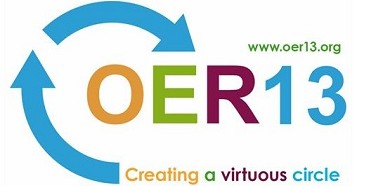We were very pleased to have invited Chris Parr from Times Higher Education to observe (and we hoped, write about) the conference and the discussions at OER13. Gratitude is due to one of our conference co-chairs, Jackie Carter, for her efforts in making this possible.
So far we’ve seen two articles, one about the keynote from Toni Pearce (NUS) and one looking more generally at responses to the Massive Open Online Course (MOOC) phenomenon, drawing on comments from Professor Patrick McAndrew of the Open University and Darco Jansen of the European Association of Distance Teaching Universities.
Unfortunately the publication of these articles coincided with THE’s re-establishment of their paywall experiments of the early 00s. This means that some people may not be able to read the articles when and where they want to – so in the spirit of openness we have attempted to offer a summary of each here.
Toni’s presentation has already created a lot of interest, and you can read full reports from Lorna Campbell and OER Research Hub online already. Chris’ article focused on Toni’s assertion that students were willing to defend the “traditional” lecture and were less demanding of technology-driven alternatives than may be expected.
“I was quite surprised to find that students will absolutely defend to the death the lecture – a mode of learning that many of us are getting used to thinking of as an out-of-date method of teaching.”
Her presentation was drawn from the findings of a research project conducted jointly between the NUS and the HE Academy as a part of the UKOER programme. A full report will be released later this year, but this early glimpse did give the impression that students are very keen on the personal and community aspects of learning.
“We can accomplish a great deal more when we’re working in a community than when we are working alone”, she noted.
A second article, published today looked at the ways in which MOOC – specifically the larger commercial MOOCs – can constrain this feeling of community. Patrick McAndrew was quoted at length on the matter.
“They are creating a sort of closed community in the open. […] You now have people who have been through a [Mooc] programme saying: ‘I want to talk about what I’ve done. I want to show people what I’ve done. But if the system itself is closed you can’t do those things.”
Patrick argued that the use of closed resources and closed platforms also restricts the opportunity for students to interact fully with the presented material, for example to translate into other languages or reuse in other settings.
Darco Jansen of EADTU was quoted in strident voice on the implications of “open” courses for educators, and the canard of MOOCs as a means of widening participation in education:
“Most students that participate in Moocs already have good access to higher education…or they have already completed higher education. So how can you say Moocs are creating more accessibility?”
Despite the arguments around the inclusiveness and spontaneity of open education practice, Darco is quoted as highlighting the classic transmission model of learning (and the neo-imperialist undertones of this model) employed in MOOCs.
“Who is providing open educational resources? They are rich people, rich companies, rich universities, because they have the money to put out free educational resources and Moocs online […] There is a lot of company money involved. It’s a new Western imperialism to conquer the world,”
It is wonderful to see OER13 reflected in the mainstream education press, and we hope that in capturing a taste of the debates and discussions during the two day conference we can encourage further participation in such debates, both online and in submissions for OER14.
